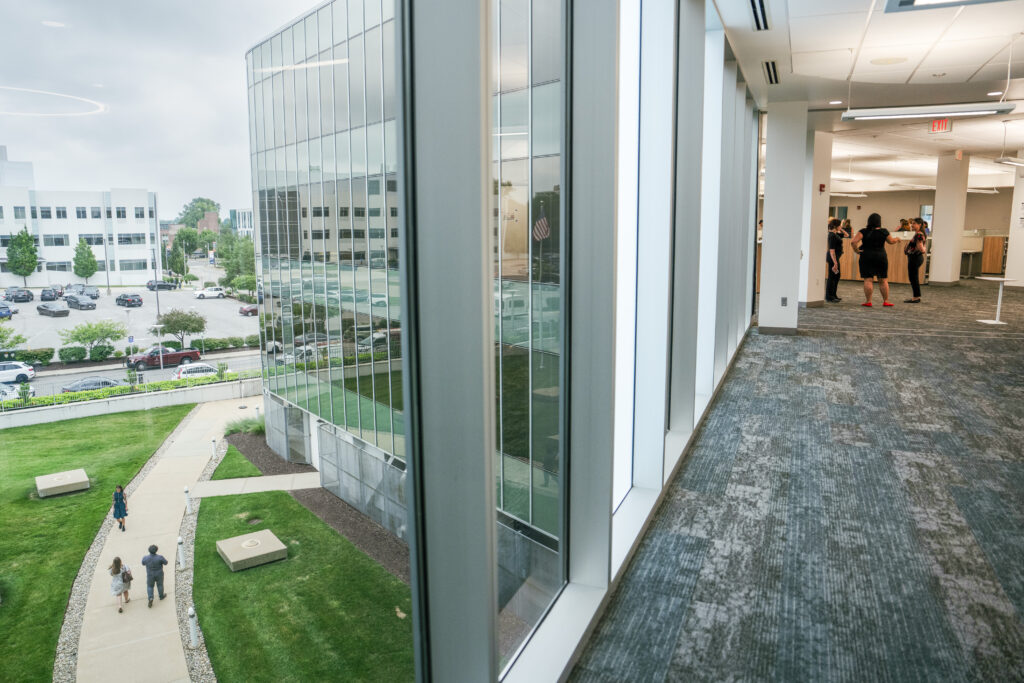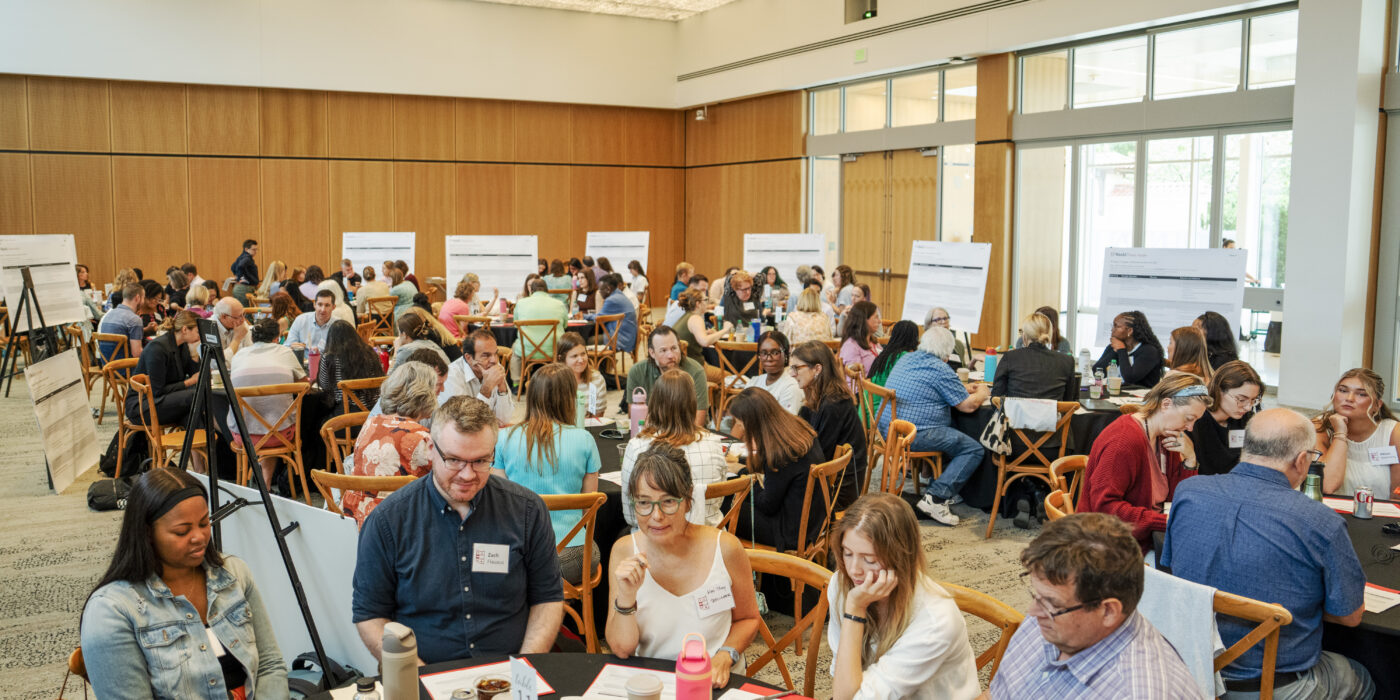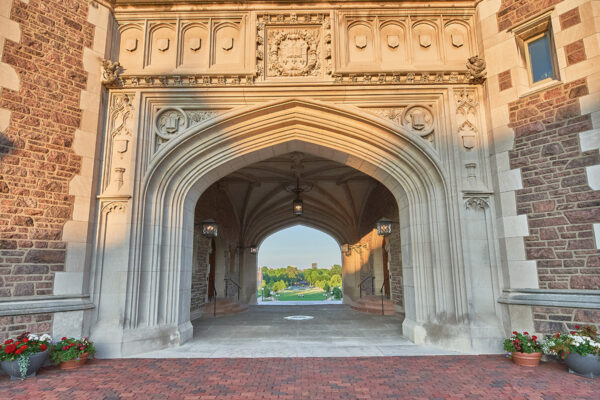The School of Public Health is accelerating its growth, with new faculty, staff and students joining its ranks, two locations now fully operational and core initiatives driving interdisciplinary collaboration and community impact. The school also is preparing for future milestones, including accreditation and the launch of a comprehensive strategic plan.
Sandro Galea, MD, DrPH, the Margaret C. Ryan Dean of the School of Public Health, the Eugene S. and Constance Kahn Distinguished Professor in Public Health and vice provost for interdisciplinary initiatives, officially began his tenure in January. He reflected on the school’s progress to date and the broader challenges facing public health.
A challenging moment for public health
Recent changes at national public health agencies, including turnover at the Centers for Disease Control and Prevention, underscore the pressures facing the field. Galea noted that these changes have been difficult for practitioners and students preparing to enter public health careers.
Despite these challenges, he emphasized that the most effective response is to remain focused on excellence and the school’s mission. “The best contribution we can make in the world of public health right now is to be excellent at what we do, to publish our papers, to push ideas forward, to teach our students, to make sure we have grants to support our scholarship, to engage in the world of practice,” Galea said. “That is our mission.”
Growth and strategic planning
The school has grown rapidly in the past months. It now includes:
- 45 primary faculty (list in progress)
- 56 secondary faculty — with primary appointments in other WashU schools, reflecting the school’s interdisciplinary model
- 117 staff, the majority in research roles
- 188 students enrolled (many of whom have transitioned from the Brown School)
“This fall, nearly 200 students joined our new school,” Galea said. “They represent the future of public health and will help us shape the kind of institution we want to become.”
Currently, the school is continuing established degree programs — the master of public health, a range of dual-degree options and the doctorate in public health sciences — while planning to broaden its academic offerings in the years ahead.
On Aug. 14, faculty and staff gathered for the school’s first all-school retreat to shape its mission, vision and values. Feedback from that retreat expanded the number of strategic imperatives. Follow-up sessions will continue throughout the year, leading to a complete strategic plan by next May.
Two locations, one community

The School of Public Health now operates across two locations, each serving distinct needs:
- 4300 Duncan/bordering the Medical Campus — Home to primarily research-focused faculty and staff. Located in the Cortex Innovation District, the 200-acre hub connects universities, health systems, startups and companies to drive innovation.
- Hillman Hall/Danforth Campus — Home to primarily education-focused faculty and staff, it provides a base for student-focused activities and academic programming.
Meetings and events will alternate between Duncan and Hillman to maintain cohesion and foster a shared sense of community.
A strong foundation
The School of Public Health builds on the legacy of the Institute for Public Health (IPH), long a hub for interdisciplinary scholarship and community engagement. Over the past year, IPH programs and operations have transitioned to the school or other university units.
In a joint message, Galea and William G. Powderly, MD, the Dr. J. William Campbell Professor of Medicine and the Larry J. Shapiro Director of IPH, announced that the institute will close at the end of this year, marking the evolution of public health at WashU. The transition reflects the university’s commitment to elevate public health as a central, fully accredited school.
Accreditation and structure
In June, the school submitted its self-study report to the Council for Education in Public Health (CEPH), the accrediting body for schools of public health. The 300-plus-page report serves as a blueprint for the school’s current state and future growth. CEPH will provide feedback before an accreditation site visit in November.
The following offices at the school oversee critical functions and provide primary points of contact for the university community:
- Executive Office and Strategic Initiatives — Drives the dean’s vision through strategy, events, special projects and continuous improvement
- Administration — Strengthens the school’s core operations through financial, facilities and grant management
- Communication — Manages internal and external communications for the school
- Education — Oversees academic programs, student support and recruitment
- Faculty Affairs — Supports faculty development, appointments and promotions
- Networks and Innovation — Leads interdisciplinary collaboration through Innovation Research Networks (see below) and strengthens research through data and analytics
- Practice — Develops pathways to translate research into real-world impact through partnerships and applied initiatives
- Research Affairs — Builds infrastructure to grow and support faculty research; helps faculty secure research funding
Innovation Research Networks
The school has launched Innovation Research Networks (IRNs) — dynamic, interdisciplinary hubs at the center of its research mission. These networks tackle public health challenges, translating discoveries into real-world impact, while fostering collaboration across the school, the university and external partners.
“Ultimately, the IRNs are envisioned as a network of networks,” said Morven A. McLean, PhD, executive director of networks and innovation and a professor of practice. “By fostering interdisciplinary teams, sharing resources and engaging students through practicums and projects, we aim to create a vibrant ecosystem for public health research.”
Each IRN is co-led by faculty from the School of Public Health and other WashU schools to foster cross-campus integration, with a full-time manager and specialized support units for funding, data management and analytics.
To stay relevant and responsive, IRNs will undergo external reviews every three years, allowing them to evolve or rotate based on emerging public health needs.
The current networks and leadership are:
- Food and Agriculture Research Mission (FARM) — Transforms agriculture and food systems through research that drives sustainable, scalable change. Led by McLean and Lora L. Iannotti, PhD.
- Dissemination & Implementation Science Innovation Research Network (DISIRN) — Accelerates the use of evidence-based solutions to close the gap between research and practice. Led by Ross C. Brownson, PhD, Elvin Geng, MD, and Byron J. Powell, PhD.
- Global Health Futures — Anticipates global health shifts and develops adaptive solutions. Led by Salma Abdalla, MBBS, DrPH, Mark D. Huffman, MD, and Victor G. Davila-Roman, MD.
- Policy and Structural Solutions (PS2) — Shapes policy and systems to improve health at the local, state and federal levels. Led by Timothy D. McBride, PhD, and Karen E. Joynt Maddox, MD.
- Planetary Health — Explores how environmental changes affect health and promotes sustainable solutions for people and the planet. Led by Dan Giammar, PhD, and TBD.
- Health Communication Collaborative — Builds listening infrastructure to create clear, actionable health information for diverse communities. Led by Matthew W. Kreuter, PhD, and TBD.
Each IRN will host an annual convening and other events to share insights and engage both experts and the public.
The first convening — the “FARM Food Futures Forum” — will be held Oct. 9 at WashU and online. Presented by the school’s FARM IRN, the forum will bring together leaders from academia, government, civil society and industry to explore how public health can integrate agricultural science, technology and market solutions to build sustainable, equitable and health-promoting food systems. Speakers will be announced soon.
Expanded engagement efforts
The school connects with internal and external audiences through The WashU Public Health Moment, a newsletter launched Aug. 31 and distributed each Sunday. Community members are encouraged to send news items and story ideas to the communications team at sphcomms@wustl.edu.
Regularly scheduled events fostering dialogue include:
- “Talking Public Health” — Typically held Wednesdays at noon, featuring invited speakers from inside and outside the university who share their research and insights.
- “Public Health Ideas” — Ongoing convenings, in person and online, around key topics of consequence to public health. Some will be in concert with the IRNs. Others are video conversations with Galea, faculty and external experts.
- “Thinking Public Health” — Conversations for faculty, staff and students, held under the Chatham House Rule, encouraging open and candid dialogue about difficult public health issues.
Recordings of “Talking Public Health” and “Public Health Ideas” are available on the WashU Public Health YouTube channel and the school’s website. On its website, the school also maintains an updated listing of other university events spotlighting public health. The school is building a more robust website, slated to launch in January, which will provide expanded resources and information.
In addition, the school supports public-facing projects such as the podcast “Complicating the Narrative,” led by Abdalla, an assistant professor and co-director of the Global Health Futures IRN. Available on YouTube, Apple Podcasts, Spotify and other platforms, the podcast is supported by the school and the Frick Initiative.
A path forward
As the newest school at WashU, the School of Public Health is built to thrive within a powerful ecosystem of interdisciplinary research and practice, forging connections across the university to amplify its impact.
“Our priority is to build a school that is robust, that stands the test of time and represents WashU well in the space of public health,” Galea said. “But we want to do that in partnership with all the other units around the university.”
These partnerships — along with its IRNs, events and strong community engagement — will be vital to strengthening public health at a time when vision and focus are urgently needed, he said.



